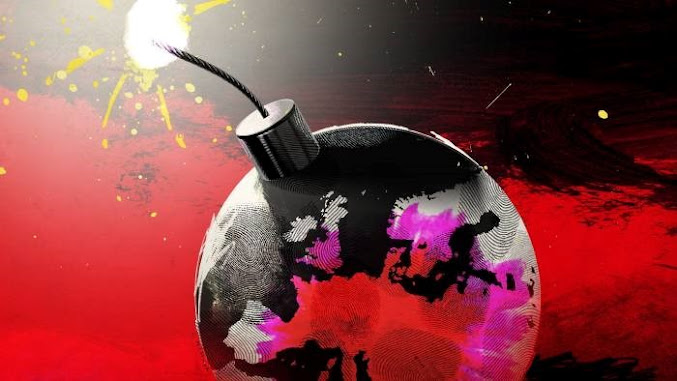The arrival of the Anthropocene is our final warning on climate
We have instigated a sixth mass extinction of other species, changed the biosphere and altered ocean chemistry
Camilla Cavendish
Every schoolchild knows the dinosaurs of the Cretaceous era were wiped out by an asteroid.
But now, it seems, we humans are the threat.
The news that we have probably entered the Anthropocene — the first epoch to be defined by the overwhelming impact of humans on Earth’s vital systems — is deeply sobering.
It’s almost too much to get your head around: that we have shaped the world so profoundly in what is, in the Earth’s history, the blink of an eye.
Most of the geological epochs in the past 4.6bn years have lasted millions of years each time.
According to the Anthropocene Working Group, the Anthropocene is thought to have begun in the 1950s, when industrialisation accelerated.
One of its hallmarks is that we humans are affecting the conditions of life everywhere, all at once.
We have instigated a sixth mass extinction of other species; we have changed the biosphere and altered the chemistry of the oceans by burning fossil fuels; we have uprooted forests and poisoned land with chemicals.
Our own flawed genius is exemplified by the fact that geologists were seeking to predict the damage we are doing to our own future even as others were continuing to deny the existence of climate change.
A Canadian lake has been chosen by the Anthropocene Working Group to track the indelible scars we might leave on the future.
Buried in its layers of sediment are artificial radionuclides from nuclear weapons testing, carbon particles produced by power plants and nitrates from chemical fertilisers.
Core samples from the lake will track progress just as the ice cores in Antarctica have traced the increase of greenhouse gases in the atmosphere.
We are not the only species to have dramatically affected the Earth.
About 2.4bn years ago, cyanobacteria evolved to photosynthesise, which changed the atmosphere.
But we are the first species able to conceptualise the delicate ecosystems of what James Lovelock called “Gaia”, and to potentially avert disaster.
It would be wrong, though, to assume that we are in control.
A decade ago, in her book The Sixth Extinction, the writer Elizabeth Kolbert described the desperate race by researchers to save the beautiful Panamanian golden frog, along with many other toads and frogs in North and South America, from a mysterious fungal disease.
Despite all their efforts — including scooping the tiny creatures up into biosecure “arks” — they could not outpace a disease that had probably been spread by humans.
Those who are attuned to the land, who have read the signs, do not need geologists to tell them that something has gone profoundly wrong.
For decades, representatives of the small island states have shown up at UN summits warning they will be wiped out by rising sea levels.
Doctors have sounded the alarm about the spread of diseases such as malaria and dengue fever as the Earth warms.
We already have psychological terms for the emotional suffering of human beings who can see what is happening but are powerless to stop it.
People whose landscapes are changing beyond recognition can experience a deep melancholy that has been termed “solastalgia”, while many urban teenagers are experiencing a misery of powerlessness known as climate anxiety.
In spite of all of this, we struggle to accept our role as guardians of the future.
Our lives seem to have become even more hectic and distracted since Gro Harlem Brundtland, the visionary prime minister of Norway, argued in 1987 that sustainable development meant not compromising future generations.
Governments have been severely hampered by what economists call the “free rider” problem, which they have tried to overcome by binding each other to global commitments.
Individuals suffer from the same problem: we are reluctant to tread more lightly on the planet if no one else does.
This, in turn, can make politicians nervous that they do not have a mandate to take more urgent action.
Yet there is a positive aspect to this peer pressure: if enough of us change our own lifestyles, installing solar panels or changing our diets or travelling less or all the other things we know we could do, others will join in.
The vegetarian movement is a good example; so is Sweden’s “flight shame”.
For a long time, environmentalists were hampered by having to urge action against threats that were largely invisible or so dispersed that the underlying pattern could be denied.
But climate change is no longer theoretical: it’s here.
And it’s no longer something that happens elsewhere, to other people.
We can all see it in the weather patterns, in wildfires, in the hottest summer on record.
None of us want to end up like Ozymandias, Shelley’s King of Kings, whose monuments to himself lay strewn across an empty desert.
So humility would be a good start.
It’s impossible to have any other reaction to the geological record.
It’s also pretty clear that it’s not enough to sit back waiting for governments to decarbonise our systems without changing our own behaviour to reduce the demands we place on those systems.
Rather than buying bunkers in New Zealand, the very wealthy might consider that ecological system collapse will spare no one and start to role model new ways of living.
There is something awesome about the march of geological time; and the chilling indifference of nature to our plight.
Each of the five mass extinctions that have occurred have created new ecological niches for other species.
Mammals expanded after the dinosaurs’ demise, and humans evolved as a result.
If we don’t want to be replaced, we should want our governments to do whatever it takes to deflect the climate asteroid.

0 comments:
Publicar un comentario